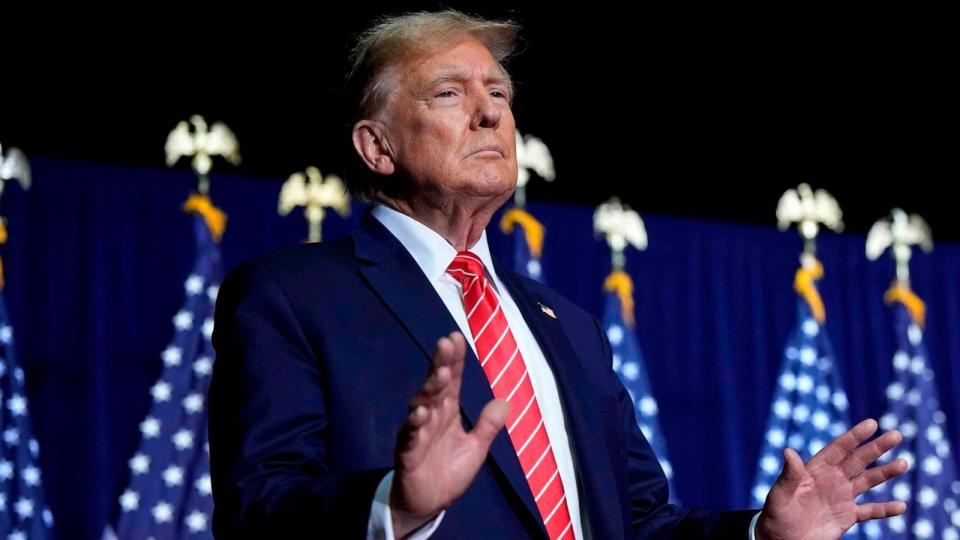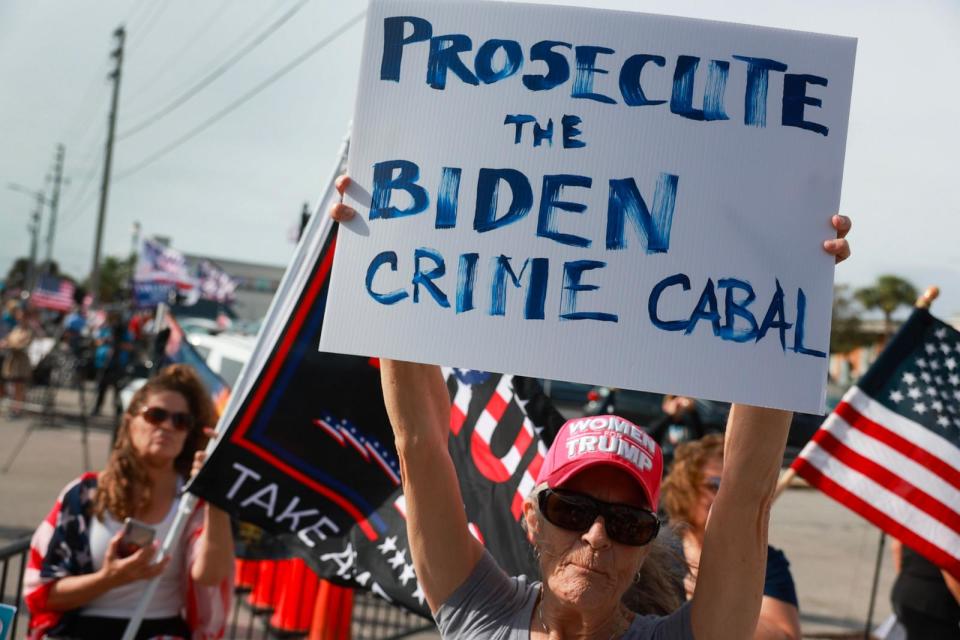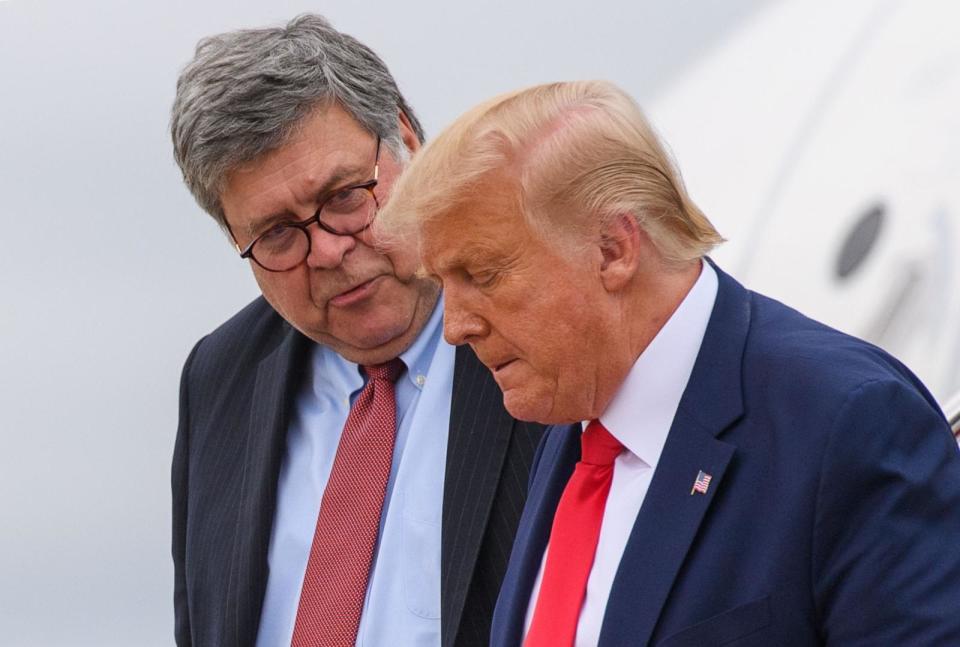Trump's dark 'retribution' pledge at center of 2024 bid, but can he make it reality?
Donald Trump, in his third run for the White House, has made "retribution" central to his agenda if elected.
"For hard-working Americans, Nov. 5 will be our new Liberation Day," Trump said as he headlined this year's Conservative Political Action Conference. "But for the liars, and cheaters, and fraudsters, and censors and imposters who have commandeered our government, it will be their Judgment Day."
Potential targets include former Rep. Liz Cheney and other individuals critical of his efforts to overturn his 2020 defeat. He recently said Cheney and fellow members of the House committee that investigated him "should go to jail" despite the fact they've not been accused of any crimes.
Last year, as he complained of "weaponization" of the Justice Department after being indicted, Trump said he would appoint a special prosecutor to go after President Joe Biden and his family.
MORE: Trump claims Liz Cheney and Jan. 6 committee should be jailed
"Donald Trump's campaign strategy has been to say that everything is chaotic, that the world is a dangerous place and the nation is falling apart, that Joe Biden is an incompetent leader and the only way to save the nation is to vote for Trump," said Jennifer Mercieca, a historian of political rhetoric at Texas A&M University. "That's not unusual for him. He has been saying that since 2016. But the strategy has been darker this time around."
"He really wants to avenge his loss in 2020," she added, "and he is very good at using language as a weapon."

But how far could Trump go, if elected, in carrying out such a vision? Or how much is it just designed to rile up his supporters, many of whom appear eager to embrace his message.
"The answer is, it depends," said Bruce Green, a Fordham Law ethics expert who examined this exact issue back in 2018.
At the very least, a retribution campaign as Trump has described would require a significant reshaping of the modern-day Justice Department, which has a tradition of independence dating back to the post-Watergate era.
Internal policies enacted at the department after the Richard Nixon Watergate scandal sought to separate politics from law enforcement, and presidents of both parties have since abided by that construct -- until Trump, according to Green.
But those policies aren't codified by law, Green noted, and if Trump were to appoint an attorney general who embraced his theory of sweeping presidential power and discretion, investigations could be launched into perceived enemies.

Even then, there are still backstops in place to deter Trump's more pointed threats. DOJ officials and prosecutors who are not politically appointed could threaten revolt, as has happened in the past. Evidence of wrongdoing would still need to be presented, and courts could reject politically-motivated cases that lack sufficient proof of a crime.
"So, you'd have whatever the traditional limitations are created by our judicial process, including the Constitution and statutes, but you wouldn't have the gatekeeping function that we've counted on the Justice Department to exercise," Green said.
MORE: Trump's 'retribution' campaign theme has apparent roots in old Confederate code, new book says
It's also worth noting Trump tried to target his political foes during his last administration and faced resistance.
He fumed at Jeff Sessions, his first attorney general, when Sessions recused himself from the DOJ's investigation into Russian meddling into the 2016 election. In various social media posts, he named people Sessions should go after, including then-FBI Director James Comey, Hillary Clinton and Barack Obama.
After firing Sessions, Trump found what many believed to be a friendlier ally in Bill Barr. Barr framed special counsel Robert Mueller's Russia report in what many said were more favorable terms for Trump than the findings warranted. He also drew scrutiny for intervening in the government's case against Trump's first national security adviser Michael Flynn and for suggesting a lighter sentence for longtime Trump ally Roger Stone. The actions led many Democrats and former DOJ officials to decry the politicization of the department under Barr's leadership.

But when Trump urged Barr and the Department of Justice to push a narrative of election fraud after his loss to Biden in November 2020, the attorney general and others declined to fall in line. Then-Vice President Mike Pence, a loyalist to Trump, also resisted his demands to unilaterally reject the election results during the certification on Jan. 6, 2021.
Elaine Kamarck, a senior fellow of governance studies at the Brookings Institution, said she believed Trump would be stopped again if he tried to use his office to go after enemies or other acts of retribution.
"The Founding Fathers anticipated a Donald Trump," Kamarck said. "They built a system of checks and balances, and it's working so far. If Donald Trump won, what would it take to dismantle that checks and balances? It would take a clean sweep of the Congress -- 60 senators in the Senate and an overwhelming majority in the House of Representatives -- and the courts to start the dismantling. And I don't see that happening at this time and I don't see it happening within the four years that he has to do it."
"In other words," Kamarck said, "we're not a banana republic yet even if he'd like to make us one."
Trump campaign spokesperson Steven Cheung, in response to expert comments that retribution would require never-before-seen politicization of the DOJ, told ABC News, "As President Trump has repeatedly said, the best retribution is the overall success of the American people."
Trump's dark 'retribution' pledge at center of 2024 bid, but can he make it reality? originally appeared on abcnews.go.com

